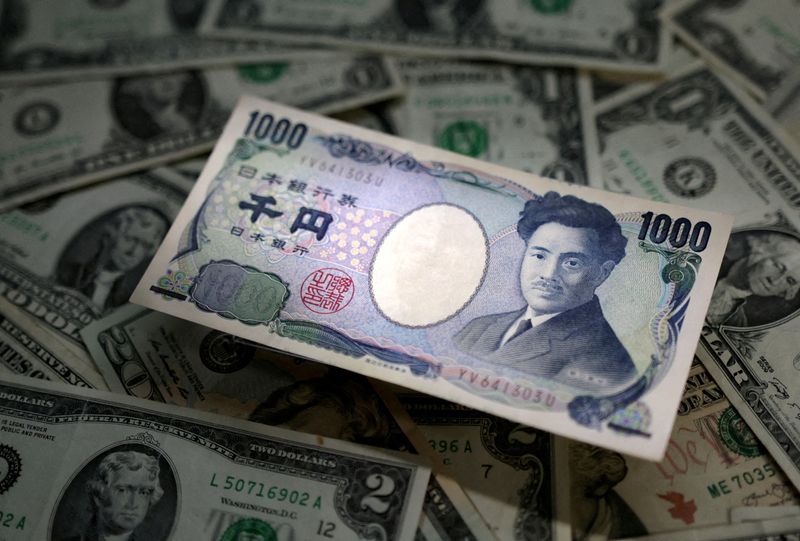By Kevin Buckland, Tetsushi Kajimoto and Gertrude Chavez-Dreyfuss
TOKYO/NEW YORK (Reuters) -The yen surged against the dollar in early Asian hours on Thursday on what traders suspected was another round of intervention by Japanese authorities to stop a sharp slide in the currency, with the 160 level seen as a key line of defence.
The dollar tumbled to precisely 153 yen from about 157.55 yen for reasons that were not immediately clear, but traders and analysts were quick to attribute it to dollar selling ordered by Japan's Ministry of Finance to support a currency languishing at 34-year lows.
The latest move came in a quiet period for the currency pair, after the U.S. stock market had closed and with the Federal Reserve's monetary policy meeting ending hours earlier.
The dollar was already on the back foot after Fed Chair Jerome Powell confirmed that the central bank's bias was towards interest rate cuts, even if the timing has been delayed by sticky inflation.
"There's no doubt the MOF intervened," said Daisaku Ueno, chief currency strategist at Mitsubishi UFJ (NYSE:MUFG) Morgan Stanley Securities, who says officials have set 160 yen per dollar as their "final defence line."
"This morning's intervention is proof that Japanese authorities will intervene any time of the day, and any day of the year," he added. "They will continue to intervene."
Bank of Japan money market projections for cash balances later showed more than 9 trillion yen ($57.96 billion) discrepancy with broker expectations. It suggests intervention around that size - which would mark a new record - though factors other than foreign exchange intervention can influence money market balances.
Additionally, Columbia University academic and former finance ministry executive Takatoshi Ito told Reuters it was plausible Japanese authorities intervened to signal they see 160 yen to the dollar as their line in the sand.
The yen has been under pressure as U.S. interest rates have climbed and Japan's have stayed near zero, driving cash out of yen and into higher-yielding assets.
The pressure has intensified since March as expectations for Fed rate cuts receded, reinforcing the yen's status as a cheap funding currency.
When contacted by Reuters, Japan's vice finance minister for international affairs, Masato Kanda, who oversees currency policy, said he had no comment on whether Japan had intervened in the market.
A U.S. Treasury spokesperson also declined to comment on the move in the currency pair.
Yellen told Reuters last week that currency interventions were acceptable only in "very rare and exceptional circumstances" when markets were disorderly with excessive volatility.
CHALLENGING
The difficulty in arresting the yen's slide has been made clear by the speed at which the currency has reversed direction after its spike.
As of 1000 GMT, the yen was 0.5% lower at 155.23 per dollar, giving up some of the ground it gained overnight.
And it remains down about 10% against the dollar this year amid receding bets for near-term Fed rate cuts, while the Bank of Japan has signalled it will go slow with further policy tightening after its first rate hike since 2007 in March.

The gap between long-term government bond yields in the two countries is a yawning 376 basis points, which helped push the yen to the weakest since April 1990 at 160.245 per dollar on Monday. Official data earlier this week suggested a sharp rebound that followed was due to Japanese intervention totalling about $35 billion, close to a record amount. The finance ministry has consistently declined to say whether it was behind the move.
($1 = 155.2900 yen)